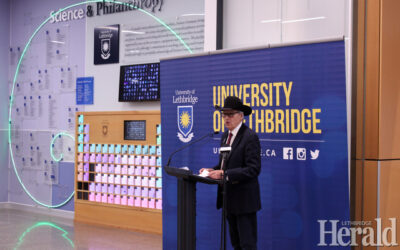U of L professors receive nearly $700,000 to continue ag research
By Theodora MacLeod - Lethbridge Herald Local Journalism Initiative Reporter on November 28, 2023.
 Herald photo by Theodora MacLeod
Board chair of Results Driven Agriculture Research, David Chalack announcing the organizations contribution to the University of Lethbridge department of Biological Sciences on Monday morning in the Science Commons building on campus.
Herald photo by Theodora MacLeod
Board chair of Results Driven Agriculture Research, David Chalack announcing the organizations contribution to the University of Lethbridge department of Biological Sciences on Monday morning in the Science Commons building on campus.Three professors at the University of Lethbridge in the Department of Biological Sciences have secured nearly $700,000 in research funding thanks to Results Driven Agriculture Research (RDAR).
Announced Monday morning in the Science Commons building, the money will extend the positions of agriculture researchers Michele Konschuh, Shelley Hoover, and Kim Stanford for another five years.
“The predictability of funding for research is most important. These announcements establish a longer runway for them to continue their good work. We at RDAR, our board and our staff, are very happy to be a part of that sustainability,” said RDAR chair David Chalack.
RDAR is an Alberta based organization that funds research in agriculture. Though it is supported in part by the Government of Alberta, it maintains an arms-length relationship with the provincial government that allows it to operate more freely.
“Our main mandate is to fund research in livestock and crops that makes an impact to producers,” Chalack said. “So, it is farmer led; the priorities are established by our members.”
Shelley Hoover, associate professor of biological sciences, studies bees and pollination, and her research looks at how they are impacted by environmental change, specifically heat and drought.
“This is a fantastic opportunity to continue the work I have been doing here at the University of Lethbridge,” she said, adding that the funding will also go toward supporting other endeavours in her lab, including research into the gut biomes of honeybees and the impacts of stress, work that is being conducted by her colleague.
“My work with various partners, locally, nationally and internationally, is aimed at ensuring our honeybees are healthy, not only for their important role as pollinators but also as producers of honey.”
Highlighting the impact of the work done by three researchers, Chalack said “the fact that the three professors, Hoover, Konschuh, and Stanford are rooted here in this institution, brings a lot of value not only to the institution but farmers in this area. Research in bees, irrigation, potatoes, and beef cattle is really important to the Ag economy and GDP here in Alberta.”
Though RDAR has previously contributed to the university, Chalack said the future of the partnership and the potential for ongoing funding from RDAR cannot go unnoticed.
“Our relationship with these professors has been in place for about two years, but this really solidifies the path forward. “
Stanford, also in the department of biological sciences, studies pathogens that can be transferred between humans and cattle. Her research aims to prevent outbreaks of food-borne disease in the future. Konschuh’s research focuses on the sustainability of crops under changing climate conditions.
The three scientists joined the university faculty in 2020 as part of the Agriculture Research Transition Project, and, thanks to the funding from RDAR, will be able to continue their work until at least 2028.
14-13


